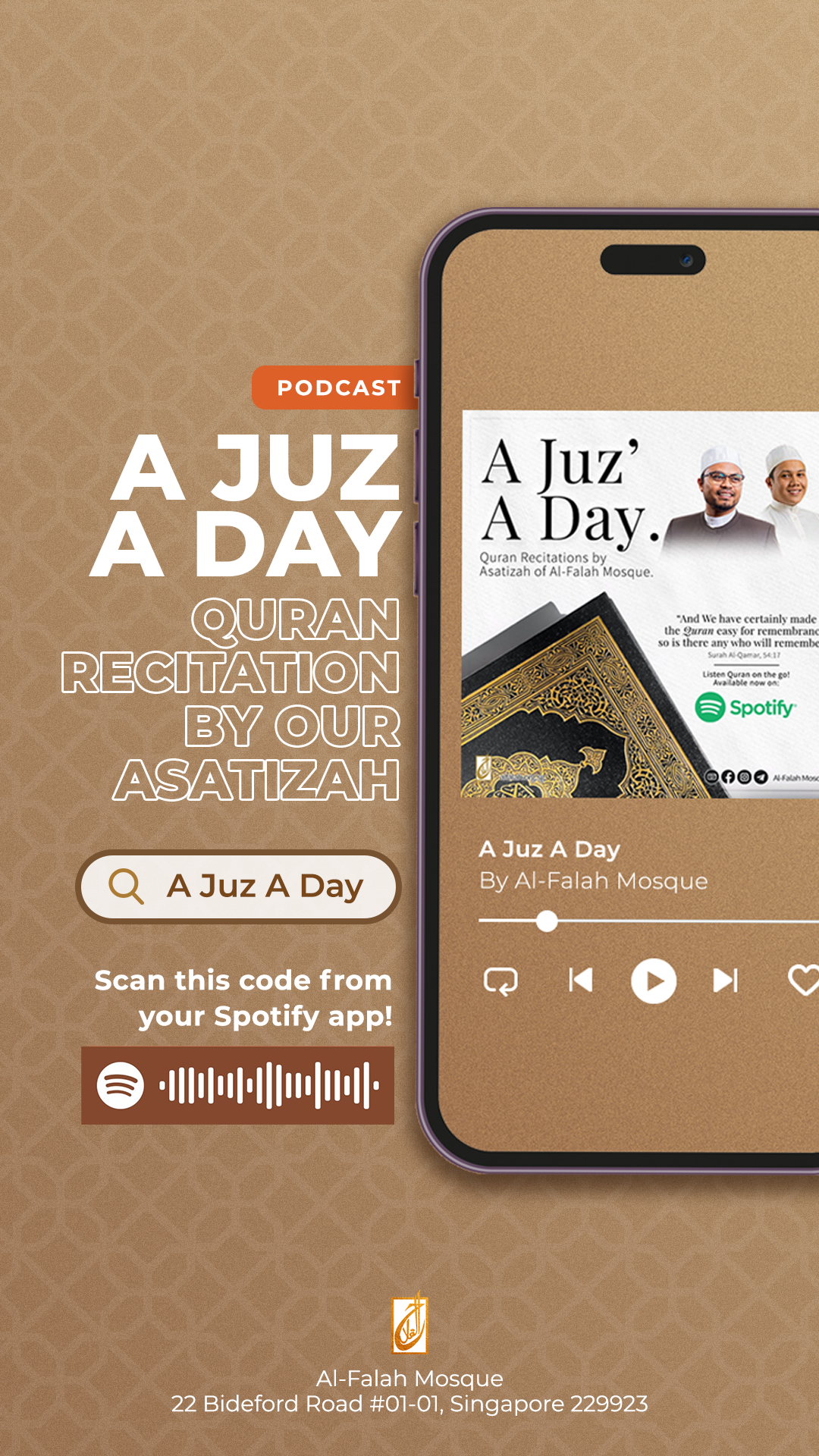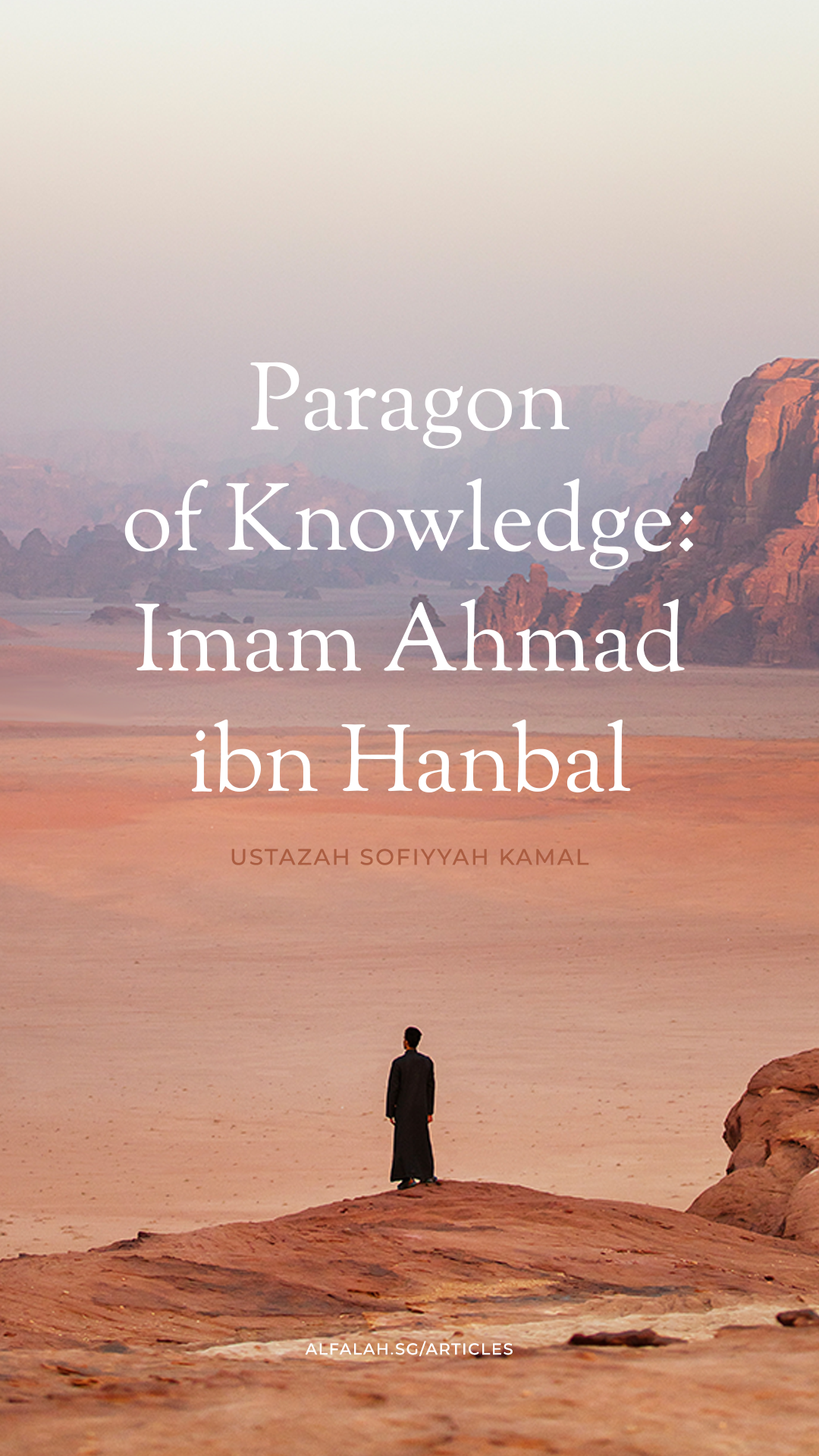Ramadan, Articles
How to Develop Positive Habits that Last
- BY Ustazah Nur Hidayah Azman
- ON
- spirituality, faith, life, barakah
How to develop habits that last
What comes to mind when we read the word ‘habits’?
By definition, they are routines that are practised regularly. They can also be described as actions that arise from an internal or external trigger. Simply put, habits are actions which are done repeatedly enough times until they become automatic and we become conditioned with it. Unnecessarily do we think too much about performing the action, it just happens on autopilot. The automisation of our actions free up energy that can be used to focus on other tasks.
As believers, we have been urged and reminded to live life with great mindfulness and to contemplate the existence of our own beings as well as all the other creations of Allah s.w.t. Living a mindful life consists of the consideration of our everyday actions. To ensure that both our physical and inward outputs are those which are constantly done to please Allah s.w.t. This begins with none other than cultivating positive habits.
What are positive habits and why are they important?
The categorisations of habits are many. Let’s name a few and present them with an example. Preventive habits are actions that lead us to ward off unwanted issues. For instance, brushing the teeth twice a day to prevent cavities. Mental habits are patterns of the mind that derive from both the conscious and subconscious. For instance, engaging in positive self-talk and practising gratitude to uplift self-esteem and manage stress. Productivity habits are efforts to better manage and accomplish goals. For instance, eliminating distractions and tackling tasks effectively, portion by portion.
In reality, we all have innumerable habits in our lives- those which are positive and negative respectively. Positive habits are those that bring benefit to our overall well being while negative habits take an opposing course. Some of us have more of the former, while others have more of the latter. Both positive and negative habits are stored the same way within the person’s subconscious mind. The brain too cannot really tell the difference between the two. A paper published by a Duke University researcher found that more than 40 percent of the actions we perform each day are not actual decisions, they are in fact habits. Good news is, all habits can be changed and replaced.
We are well aware that developing and improving oneself is a constant process that is crucial in the life of every individual. What more for the believer, as those who strive towards purification and betterment are loved by Allah s.w.t. Such development and improvement will require taking actionable steps to create holistic positive changes. This includes the multidimensional parts of the human being- the physical, mental, emotional, social, intellectual and spiritual aspects. The key to creating positive change for one’s self is to make desired actions turn to positive habits that last.
Indeed, nurturing and maintaining positive habits can create meaningful and pleasant changes in our lives. Let us explore how we can go about it.
How to nurture good habits
Awareness leads to attitude. Attitude leads to habits. And habits lead to behaviour. The more we practise these behaviours, the more consistent we become in adopting them and making them a part of us and our lives.
Be it practising to pray on time, scheduling to sleep early, reciting the Quran daily, amongst others- positive habits demand consistency. It requires an individual to commit through the process. This includes trying at it and doing the work every single day. Consider the following techniques to get started on building positive yet transformative habits:
(1) Set a timer for 5-minutes
Sounds simple, doesn’t it? Many may struggle with procrastination when it comes to starting and building something new and positive. Most times it stems from the fear of the unknown experience. It can be daunting to not know what lies ahead, especially when it is a matter that one has never explored before. The key is to make it easy to get started and relieve some of the pressure for the task.
This technique requires us to set a timer for just 5-minutes to work on the new good habit. Once the timer begins, start working on the habit until the allocated time ends. What you may notice is that once the timer goes off, it feels easier to keep going and you wouldn’t want to stop. If this happens, then keep going. Set another five minutes and time yourself to which extent you would want to exercise the good habit in one seating.
(2) Replace one bad habit with a good one
While it is important to do away with bad habits, one will need to realise that replacing it with a good one is pertinent. Allah s.w.t. mentions in the Quran:
وَأَقِمِ الصَّلَاةَ طَرَفَيِ النَّهَارِ وَزُلَفًا مِّنَ اللَّيْلِ ۚ إِنَّ الْحَسَنَاتِ يُذْهِبْنَ السَّيِّئَاتِ ۚ ذَٰلِكَ ذِكْرَىٰ لِلذَّاكِرِينَ
“And establish prayer at the two ends of the day and approach of the night. Indeed, good deeds do away with misdeeds. That is a reminder for those who remember.” (Surah Hud: verse 114)
Oftentimes, removing bad habits from our day-to-day will only leave gaps behind. Think of it as removing a rotten plant from the soil. Without replacing and filling the hole with a healthy plant, it will only attract unwanted insects, animals or articles that may harm other plants within the same plot of land. As such, this technique will require minds which are alert and attentive, potting out ‘rotten plants’ and replacing them with non-harmful ones.
Begin to identify a good habit you wish to develop and appoint it as a replacement for a bad habit that you may be struggling with. An example would be to practise more of dhikr, ie. remembrance of Allah swt. Catch yourself whenever words are uttered without benefit, and replace it with the mentions of dhikr. It may seem odd at first, to have both actions happening one after the other. What happens is that you are training your mind and body to automate the good habit whenever that particular bad habit happens. Eventually, it will be easier to reach out for the positive habit and do away with what is negative.
(3) Create a reward system
Humankind has been created to be reward-driven and become much more motivated when there is benefit in their pursuits. This subsequent technique requires you to create a reward system for yourself. The idea is to set a reward for every actionable step taken to work on a good habit that is lasting. This reward needs to be something that can inspire oneself to put in the effort and attain what has been intended at the beginning.
In addition to inspiration, the reward has to be a matter that is beneficial and brings goodness at the same time. This could be a time to go out for a walk, to start on a new book you have been wanting to read, spend time with your loved ones or even sleep in to catch up with the well-deserved rest. Avoid rewards that will be detrimental to our being at the end of the day. Be creative, but beneficial.
How to maintain a sunnah as good habits in our daily lives
As believers, we understand that practising the sunnahs of the Prophet s.a.w. need not be a one-off action. It requires many moments of consistency, making it a regular practice. Think about a sunnah that you would want to inculcate in your life. What is the sunnah practice all about? What do you envision your life to be when the sunnah is a part of you? The Prophet s.a.w. explained that following the sunnah is that of a good practice.
مَنْ سَنَّ سُنَّةً حَسَنَةً فَعُمِلَ بِهَا بَعْدَهُ كَانَ لَهُ أَجْرُهَا وَمِثْلُ أُجُورِهِمْ مِنْ غَيْرِ أَنْ يَنْقُصَ مِنْ أُجُورِهِمْ شَيْئًا وَمَنْ سَنَّ سُنَّةً سَيِّئَةً فَعُمِلَ بِهَا بَعْدَهُ كَانَ عَلَيْهِ وِزْرُهُ وَمِثْلُ أَوْزَارِهِمْ مِنْ غَيْرِ أَنْ يَنْقُصَ مِنْ أَوْزَارِهِمْ شَيْئًا
“Whoever introduces a good practice (sunnah) that is followed after him, will have a reward for that and the equivalent of their reward, without that detracting from their reward in the slightest. Whoever introduces an evil practice that is followed after him, will bear the burden of sin for that and the equivalent of their burden of sin, without that detracting from their burden in the slightest.” (Hadith Sunan Ibn Majah: 207)
Definitely sunnahs are many and various parts of our lives can be elevated with the good practices of the Prophet s.a.w. Afterall, following the ways of the beloved will only attain nothing else but the love and pleasure of Allah s.w.t. Beautifully, part of the sunnah of the Prophet s.a.w. is the practice of consistent good habits as well. Consider the following approaches to maintain sunnahs as good habits that will upraise your life:
(1) Identify the purpose behind each sunnah
One of the important pillars to ensure the consistent practice of the sunnah is to realise its purpose and the impact it will bring to our lives. Identifying this allows us to be mindful in our pursuits and gives a sense of meaning to the intentions we make. The Prophet s.a.w. highlighted the importance of our intentions that bring purpose to our every action. He s.a.w. urged for us to begin with the end in mind.
إِنَّمَا الْأَعْمَالُ بِالنِّيَّاتِ وَإِنَّمَا لِكُلِّ امْرِئٍ مَا نَوَى فَمَنْ كَانَتْ هِجْرَتُهُ إِلَى اللَّهِ وَرَسُولِهِ فَهِجْرَتُهُ إِلَى اللَّهِ وَرَسُولِهِ وَمَنْ كَانَتْ هِجْرَتُهُ لِدُنْيَا يُصِيبُهَا أَوِ امْرَأَةٍ يَنْكِحُهَا فَهِجْرَتُهُ إِلَى مَا هَاجَرَ إِلَيْهِ
“Verily, deeds are only with intentions, and every person will have only what they intended. Whoever emigrated to Allah and His Messenger, his emigration is for Allah and His Messenger. Whoever emigrated to get something in the world or to marry a woman, his emigration is for that to which he emigrated.” (Hadith Muttafaqun ‘Alayh, Sahih al-Bukhari: 54, Sahih Muslim: 1907 )
Start by reflecting on a sunnah that you intend to maintain as good habits. Ask yourself important questions like, why is this sunnah practice important to me? How can it bring a positive impact into my daily life? Why is it something that was encouraged by the Prophet s.a.w.? Write down the responses to have a clearer view of what you intend to achieve. This will give more room to explore the depths of the sunnah, its significance and a boost to our rightful intent.
(2) Focus on sustainable deeds
Sustainable deeds allow us to focus one thing at a time and build strength for each sunnah that we wish to pursue. The Prophet s.a.w. reminded us about the nature of deeds which are best and most loved by Allah s.w.t.
اكْلَفُوا مِنَ الْعَمَلِ مَا تُطِيقُونَ فَإِنَّ خَيْرَ الْعَمَلِ أَدْوَمُهُ وَإِنْ قَلَّ
“Take up good deeds only as much as you are able, for the best deeds are those done regularly even if they are few.” (Hadith Sunan Ibn Majah: 4240)
It is worthy to take note that the Prophet s.a.w. included a couple of concepts in a single narration. First, taking up good deeds. Deeds are what we choose to do- consciously and mindfully. To know and learn how much impact it will bring to our lives once they are practised. Second, as much as you are able to. Here the Prophet s.a.w. placed an emphasis to do things which are within our capacity and not to overexert ourselves in the process. Thus, contributing to the sustainability of things. Finally, best deeds are of two- when done regularly and are of a few. Consolidate these concepts into a checklist and you are on your way to invest in deeds that are sustainable and of quality.
(3) Seek the help of Allah s.w.t.
Through all of our daily affairs and pursuits, we are constantly in need of the help of Allah s.w.t. We are but creations who are incapable without the Creator. While we continue to input best practices to achieve a certain outcome, the help of Allah s.w.t. is the core of it all. Allah s.w.t. mentions in the Quran:
إِيّاكَ نَعبُدُ وَإِيّاكَ نَستَعينُ.اهدِنَا الصِّراطَ المُستَقيمَ
“It is You we worship and You we ask for help. Guide us to the straight path.” (al-Fatihah: verse 5-6)
Through these two verses in the opening chapter of the Quran, we find that the believer is guided to address their challenges, issues and concerns in a comprehensive way. Seeking the help of Allah s.w.t. reflects one’s great faith in Him, complete trust and full reliance. The help that we seek from Allah s.w.t. is one that is filled with guidance to all that is best and rightful. Again, we may never have the guarantee of how all matters will turn out, whether pleasant or otherwise. But one thing is for sure, with the help of Allah s.w.t., it will only lead us to the right places and the best outcome.
Du’a (supplication) to Practice
Last but not the least, is to supplement every action with a supplication. The Prophet s.a.w. taught us a humbling du’a, seeking Allah s.w.t. to allow us to follow through our positive habits building with His guidance.
اللَّهُمَّ إِنِّي أَسْأَلُكَ الْهُدَى وَالسَّدَادَ
Allahumma inni as-aluka al-hudaa wa al-sadaad
“O Allah, I seek from you guidance towards righteousness and adhering to the straight path.” (Hadith Sahih Muslim: 2725)
In a separate narration from Musnad Ahmad (Hadith 664), the Prophet s.a.w. explained that when one is asking for guidance (al-Hudaa), to think of it as seeking directions while traveling. And when one asks Allah s.w.t. for adherence (al-Sadaad), often translated as proper aim, to think of it as the aiming of an arrow. This blessed du’a comes with two important things that every servant is beseeched to ask from Allah s.w.t. Success and happiness cannot be attained without both of these elements. May we continue to seek both al-Hudaa and al-Sadaad in our pursuits to develop positive habits that last, insyaAllah.
Remember, forming positive habits is an ongoing process that takes time, patience and commitment. For the believer, it entails building on faith, strengthening trust and great submission to Allah s.w.t. With the right steps taken and the best intentions, one will surely attain what they have intended for. Best part is, every step of this pursuit will be rewarded. The most positive habits begin with taking the first step for the sake of Allah s.w.t.
Disclaimer
Support Our Dakwah














